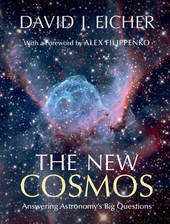
|
The New Cosmos: Answering Astronomy's Big Questions
Hardback
Main Details
| Title |
The New Cosmos: Answering Astronomy's Big Questions
|
| Authors and Contributors |
By (author) David J. Eicher
|
|
Foreword by Alex Filippenko
|
| Physical Properties |
| Format:Hardback | | Pages:295 | | Dimensions(mm): Height 252,Width 197 |
|
| Category/Genre | Popular astronomy and space |
|---|
| ISBN/Barcode |
9781107068858
|
| Classifications | Dewey:520 |
|---|
| Audience | |
|---|
| Illustrations |
90 Halftones, color
|
|
Publishing Details |
| Publisher |
Cambridge University Press
|
| Imprint |
Cambridge University Press
|
| Publication Date |
3 December 2015 |
| Publication Country |
United Kingdom
|
Description
Over the past decade, astronomers, planetary scientists, and cosmologists have answered - or are closing in on the answers to - some of the biggest questions about the universe. David J. Eicher presents a spectacular exploration of the cosmos that provides a balanced and precise view of the latest discoveries. Detailed and entertaining narratives on compelling topics such as how the Sun will die, the end of life on Earth, why Venus turned itself inside-out, the Big Bang Theory, the mysteries of dark matter and dark energy, and the meaning of life in the universe are supported by numerous color illustrations including photos, maps and explanatory diagrams. In each chapter the author sets out the scientific history of a specific question or problem, before tracing the modern observations and evidence in order to solve it. Join David J. Eicher on this fascinating journey through the cosmos!
Author Biography
David J. Eicher is Editor-in-Chief of Astronomy magazine, and one of the most recognized astronomy enthusiasts in the world. He has spoken widely to amateur astronomy groups and written eight books on astronomy including Comets: Visitors from Deep Space and The Universe from your Backyard. He is president of the Astronomy Foundation and a member of the Board of Directors for Starmus Festival. An avid observer of astronomical objects for more than thirty-five years, he was honored by the International Astronomical Union with the naming of a minor planet, 3617 Eicher.
Reviews'David Eicher has more than three decades' experience of writing about astronomy for a general readership. His experience and enthusiasm shine through in this wide-ranging survey of current 'hot topics'.' Martin Rees, Emeritus Professor of Cosmology and Astrophysics, University of Cambridge 'The New Cosmos by David Eicher is a wonderful read! This wonderfully written, accessible, authoritative new book spans the breadth of major topics in early twenty-first-century astronomy, engaging the reader in every chapter. I haven't seen a better book surveying modern astronomy in a decade. I highly recommend this masterpiece as a gift to yourself or anyone interested in space and astronomy.' Alan Stern, Principal Investigator of the New Horizons mission, Southwest Research Institute 'If you are looking for a collection of newspaper headlines full of hype about this discovery or that, then The New Cosmos probably isn't for you. On the other hand, if those headlines whet your appetite for something more substantial, then pick up a copy and settle in for a fascinating and enlightening read. The New Cosmos is not simply a survey of astronomy and planetary science - it is more of a travelogue, starting with intriguing questions and then following where each story leads. And there throughout the journey is David J. Eicher's obvious passion and joy for the wonders of the heavens, and for the human quest to make those wonders known.' Jeff Hester, Professor Emeritus, School of Earth and Space Exploration, Arizona State University 'In this book, Eicher synthesizes a wealth of relatively new information into an interesting, coherent, up-to-date overview of many of the most important and exciting areas of astronomy ... Immersing yourself in the chapters that follow will give you a new sense of wonder at the amazing universe that we inhabit, yet simultaneously awakening both your humility as a cosmic speck of dust and your awe at our present understanding of the cosmos.' Alex Filippenko, University of California, Berkeley, from the Foreword 'This is an exceptional book that places our life in a global perspective on the cosmic stage, both in space and in time. It leaves you wondering whether our civilization should reconsider its priorities if it wishes to be regarded as intelligent.' Abraham Loeb, Harvard University 'David Eicher provides a much-needed update to Carl Sagan's classic book Cosmos from thirty-five years ago, describing the most fascinating advances in astronomy and planetary science.' Alfred McEwen, Lunar and Planetary Laboratory, University of Arizona, Tucson 'The New Cosmos is an enjoyable stroll through our current knowledge of the objects in the cosmic zoo. As a planetary scientist, I welcome the opportunity to learn about fields distant from my own. I know that I can trust their treatment because my own field is expertly and concisely covered. Bravo!' Paul D. Spudis, Lunar and Planetary Institute, Houston 'It can be easy to forget just how many different major astrophysical discoveries have taken place in recent years. Eicher takes the reader through a whirlwind tour of the most exciting highlights, from newly discovered planets in our own cosmic backyard, to the dark matter and dark energy that are ubiquitous throughout our universe. The New Cosmos covers all of the 'big questions' that are being nervously and excitedly debated in the hallways of astronomy and physics departments around the world.' Dan Hooper, Fermilab, Illinois 'If you want to know what happens when the Sun dies, or wish to understand such puzzles as the true nature of black holes and the long-term fate of the universe, then you should be reading this book. In clear and authoritative prose, David Eicher offers readers a wonderful set of answers to the most consequential questions in astronomy. It's an impressively comprehensive treatment of the biggest subject of all - the cosmos.' Seth Shostak, SETI Institute, California
|